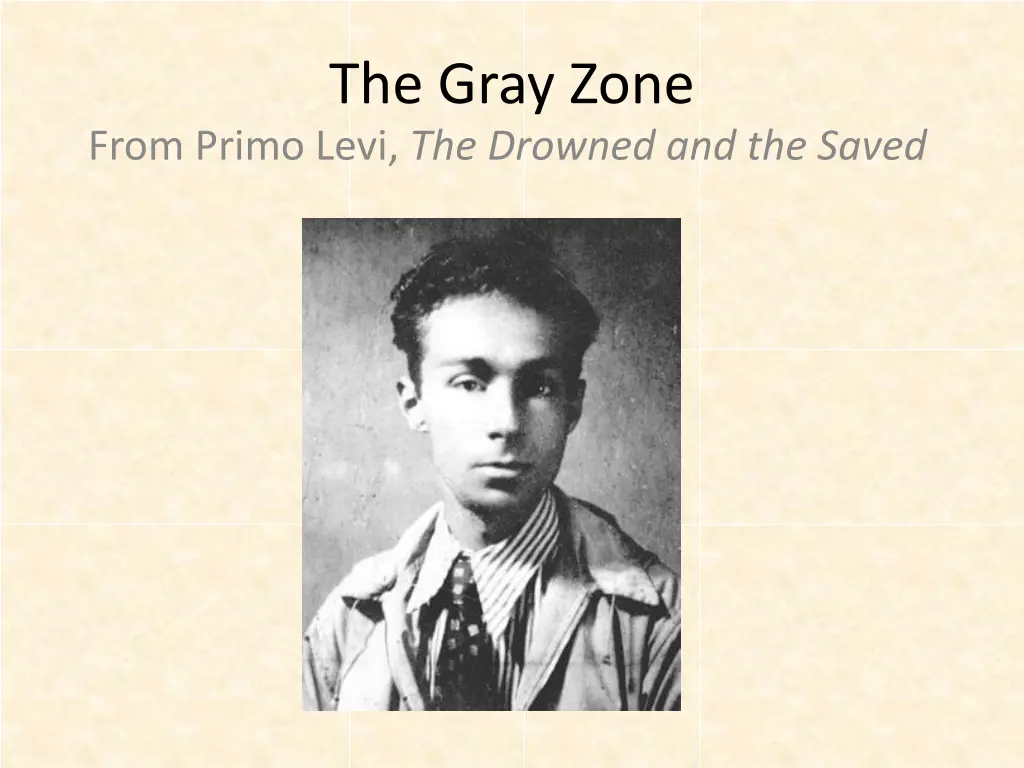
Primo Levi's Insights on Life Inside Concentration Camps
Explore Primo Levi's profound reflections on the harrowing experiences within concentration camps, delving into arrival shocks, dynamics between prisoners, the gray zone of power, and the heinous acts of the Sonderkommando. Levi's poignant observations shed light on the grim reality and degradation faced by victims within these infernal systems.
Download Presentation

Please find below an Image/Link to download the presentation.
The content on the website is provided AS IS for your information and personal use only. It may not be sold, licensed, or shared on other websites without obtaining consent from the author. If you encounter any issues during the download, it is possible that the publisher has removed the file from their server.
You are allowed to download the files provided on this website for personal or commercial use, subject to the condition that they are used lawfully. All files are the property of their respective owners.
The content on the website is provided AS IS for your information and personal use only. It may not be sold, licensed, or shared on other websites without obtaining consent from the author.
E N D
Presentation Transcript
The Gray Zone From Primo Levi, The Drowned and the Saved
Arrival at the Camps the arrival in the Lager was indeed a shock because of the surprise it entailed. The world into which one was precipitated was terrible, yes, but also indecipherable: it did not conform to any model; the enemy was all around but also inside, the we lost its limits One entered hoping at least for the solidarity of one s companions in misfortune, but the hoped-for allies, except in special cases, were not there (Levi 38)
Simple vs. Privileged Prisoners the entry ritual, and the moral collapse it promoted, was abetted more or less consciously by the other components of the concentration camp world: the simple prisoners and the privileged ones. Rarely was a newcomer received, I won t say as a friend, but at least as a companion-in- misfortune; in the majority of cases, those with seniority showed irritation or even hostility. The newcomer was envied because he still seemed to have on him the smell of home He was derided and subjected to cruel pranks there is no doubt that life in the Lager involved a regression, leading back precisely to primitive behavior (Levi 39).
Inside the Camps It is na ve, absurd, and historically false to believe than an infernal system such as National Socialism sanctifies its victims; on the contrary, it degrades them, it makes them resemble itself, and this all the more when they are available, blank, and lacking a political or moral armature (Levi 40). The ascent of the privileged, not only in the Lager but in all human coexistence, is an anguishing but unfailing phenomenon: only in utopias is it absent .It is a gray zone, poorly defined, where the two camps of masters and servants both diverge and converge. This gray zone possesses an incredibly complicated internal structure and contains within itself enough to confuse our need to judge (Levi 40). Thus the Lager, on a smaller scale but with amplified characteristics, reproduced the hierarchical structure of the totalitarian state, in which all power is invested from above and control from below is almost impossible (Levi 47).
The Sonderkommando one is stunned by this paroxysm of perfidy and hatred: it must be the Jews who put the Jews into the ovens; it must be shown that the Jews, the subrace, the submen, bow to any and all humiliation, even to destroying themselves (Levi 52).
Conceiving and organizing the squads was National Socialisms most demonic crime. Behind the pragmatic aspect (to economize on able men, to impose on others the most atrocious tasks) other more subtle aspects can be perceived. This institution represented an attempt to shift onto others specifically, the victims the burden of guilt, so that they were deprived of even the solace of innocence (Levi 53).
The Final Defeat In fact, the existence of the squads had a meaning, a message: We, the master race, are your destroyers, but you are no better than we are; if we so wish, and we do so wish, we can destroy not only your bodies but also your souls, just as we have destroyed ours (Levi 53-54).






















